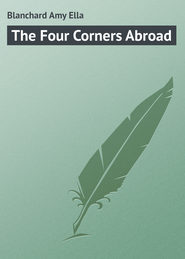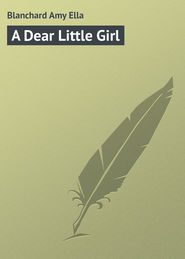По всем вопросам обращайтесь на: info@litportal.ru
(©) 2003-2024.
✖
The Four Corners
Настройки чтения
Размер шрифта
Высота строк
Поля
"We-alls don't come aroun' that-a-way from town; we comes up the other side; it's a little mite furder but it ain't so steep."
"Oh, that's it. I wish we had known." Then feeling that she had established a sufficient acquaintance to put her important question she asked, "You didn't happen to find a little watch in the leaves, did you? My cousin lost it. He sets such store by it and we all came up the mountain this afternoon to help him find it."
For answer the girl put her hand down into the bosom of her frock and drew forth something which she held out in her palm. It was Phil's watch.
"Oh!" Mary Lee turned and called: "Polly, Polly, it's found! it's found!" She turned to the girl again. "Where did you find it? and please tell me your name."
"My name's Daniella Boggs," said the girl, taking a shy look at Polly Lewis who now came up.
Polly put out her hand and gently detained the girl who seemed about to flee. "We are so much obliged," she said. "My little brother was distressed at losing his watch. Where did you find it?"
The girl who had put one finger in her mouth, took it out and pointed to the heap of leaves by the log. It was evident that in stooping over to gather them Phil had dropped the watch.
Colonel Lewis moved toward them but Polly waved him off. She saw that the girl was too shy to stand more company, and she left her with Mary Lee, herself returning to her father. "Offer her a reward," he said. "Of course it was very honest of her. She could easily have said that she had seen nothing of the watch. Here," he took a bill from his pocketbook and handed it to Polly, "give her this and tell her we all thank her very much."
Polly carried the bill to the girl. "My father and all of us are very much obliged to you," she said, "and we want you to take this."
Daniella retreated, shaking her head and putting her hands behind her. "I don't want it," she said. "I ain't done nothin' to earn it. 'Twa'n't no work nor nothin'."
"Oh, but," Polly argued, "when people lose things, they expect to give a reward to whoever finds them."
Daniella still shook her head. "I ain't done nothin'," she repeated. "Maw wouldn't like me to take money."
"But you could spend it in town."
"Don't never go to town."
"But isn't there anything you would like? Your mother could buy it for you, you know."
Daniella looked at the red knitted jacket which Mary Lee wore. "I like that," she said, nodding her head toward it.
"Then you shall have one just like it," said Polly, heartily. "I will go right to work and knit it myself. Wouldn't you like a pair of shoes for winter? and can you read?"
"Maw kin. I kain't. I'd like the shoes when it snows, but I hates to put 'em on befo' that."
"Then you shall have a pair all ready for the first snow," Polly told her.
"I wish you would come to my home some day. Will you, if we come for you?" asked Mary Lee, with a missionary spirit of enlarging the girl's ideas.
"I'd be skeered," said Daniella.
"Oh, no, you wouldn't. I have three sisters and we don't live right in the town; it's like country. We have chickens and things."
"I've got some chickens," returned Daniella, "an' I've got a pig, too. Maw wouldn't let me go to town, I reckon, 'cause I ain't got clothes like you-uns. She ain't no time to make 'em. She too busy nussin' grandad. He right foolish-lak now, jest lak a baby."
"Well, we'll come some day to see if your mother will let you come to town," said Mary Lee.
"And I will bring you a red jacket like this." Polly put her hand on Mary Lee's arm. "Good-bye, Daniella. We shall not forget you."
Daniella smiled, but made no reply. She wondered if she would really ever have such a beautiful thing as that red jacket. About going to town she was not so keen, for she had never been there in all her short life, and, though she half longed to see its wonders, she feared to step beyond the confines of her own forest.
She watched the party ride off, but turned to run as Phil, who declared he must thank her personally, went toward her. Like a deer the girl fled, not stopping till she was safe in her own cabin-home. Her courage had stood all that one afternoon would allow.
CHAPTER XIV
DANIELLA
Mary Lee came home full of her afternoon's experience and could talk of nothing but Daniella. Accordingly, when Nan discovered that not only Mary Lee, but her Cousin Polly, and even the boys, showed an interest in the little mountain maid, she felt that she was rather out of it and begged Polly to take her up to the cabin when she should go with the red jacket. Jack and Jean, too, were greatly interested. Said Jean: "My Sunday-school teacher said I must try to make something for the church basket and that it would be sold for the home missions, but I am going to make it for Daniella instead, for I am sure she is a home mission, and I would thrice as soon she would have it. It is dreadful for any one to go barefoot in winter. I've begun to crochet some lace and I will sell that and buy something for Daniella." So, thereafter, wherever Jean went, she carried her spool of thread and her crochet needle. Her length of rather soiled, somewhat uneven lace grew apace and she set her hopes upon selling it.
Jack took no such industrious means of showing her concern, unless one may consider her method an industrious one, for she called on various of the school children to come to a peep-show, one penny admission. Ten girls came, and with the proceeds Jack bought corn to pop. Nan helped her to turn it into delectable pop-corn balls which were so toothsome that Ran and Ashby bought most of them, and their boy friends were customers for the remainder, so with little labor Jack was fifty cents to the better and serenely watched her less quick-witted sister Jean patiently working her lace.
Nan and Mary Lee took a hint from Jack and conceived the plan of having a bazaar for the benefit of the little mountain girl. The boys fell in with the plan; some of the schoolgirls joined them and Cousin Polly Lewis herself offered to mother the scheme.
"It is very exciting," said Nan to Mary Lee when they had taken the first decided move. "I keep thinking of all sorts of things to do and of people to ask for contributions. Do you suppose, Mary Lee, it would do to ask grandmother? I shouldn't in the least mind asking Aunt Helen."
"I wouldn't ask them for the world," replied Mary Lee.
"But it isn't for ourselves."
"I don't care; it's asking just the same isn't it?"
"Yes, that's so, and I made up my mind never to ask them for the least thing."
"It's all very well to be friends with them, I suppose," said her sister. "I mean to be polite to them if I ever meet them, but I don't think we ought to place ourselves under obligations to them in the smallest way." Mary Lee evidently voiced her Aunt Sarah's opinions.
"Oh, well," sighed Nan, "then I won't, but I am going to tell them about Daniella. I was just thinking, Mary Lee, suppose Daniella won't take anything after we have had the bazaar for her benefit. What shall we do then?"
"Give the money for something else: home missions or traveling libraries or something. We shall have had the fun anyhow," a view of the matter which Nan regarded as very sensible. Mary Lee generally did have sensible advice to give.
"I'll make a lot of panuchee," Nan went on, "and I'll put black walnuts in some; nearly every one likes that kind best. I know the Academy boys will buy it, and that it will go off like hot cakes. Cousin Mag is going to send a fine cake and Miss Bouldin has promised one. Do you think it would be best to have a fancy table or just things to eat?"
Mary Lee considered the question. "It will be a little more trouble to have the fancy table, but if we find people want to give things of that kind we can have it. We'll ask Cousin Polly."
"And where shall we have it?" said Nan. This was the most frequently discussed question and they had not, as yet, come to any satisfactory answer to it.
Mary Lee looked out of the window thoughtfully. "I am sure I don't know," she replied. "No one wants to give up a room big enough."
"If mother were only here," sighed Nan, "she'd think of some place that would do; she always has ideas." Then suddenly the girl gave a little squeal and clutched Mary Lee's arm. "I know," she cried. "Why didn't we think of it before? We'll have nothing to pay for it and it will not put any one to inconvenience, and it will be as if we really had it ourselves as we wanted to do in the first place. We can use the old wing."
"Of course we can," said Mary Lee. "It will be just the place. There is plenty of room up-stairs or down. We can have the eatables in the library and the fancy things up-stairs in the room over it. Nan, that's splendid. Let's go straight to tell Polly."
They dashed out of the house and down the street to the Lewis's where Polly met them at the door.
"We have an idea," said Nan, breathlessly.
"I thought you must have something the way you came tearing," said Polly. "I'm glad it isn't anything breakable."
Nan was too anxious to give her suggestion to notice the playful irony. "We're going to have the bazaar in the old wing of our house," she said. "It's empty and handy and – "











